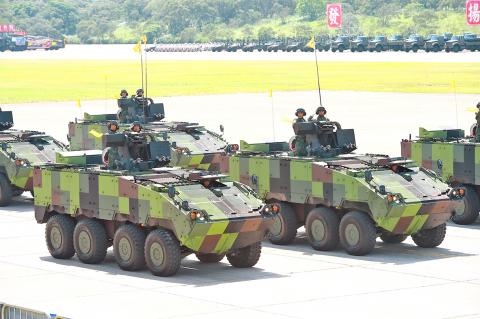Public prosecutors have detained dozens of military officials and civilian defense contractors for questioning as part of a massive operation yesterday investigating military corruption in which contractors allegedly provided cheap, inferior components from China that were used to produce CM-32 “Clouded Leopard” armored vehicles.
The operation involved raids that resulted in about 60 people being detained, along with the seizure of documents and other evidence at 37 locations across the nation, including the Ministry of National Defense’s Procurement Office, the Ordnance Readiness Development Center in Nantou County and the ministry’s Armaments Bureau 209th Arsenal, which has its facilities at the ordinance center.
Military officials and supervisors of the ministry’s procurement program allegedly colluded with unqualified contractors over a NT$7.6 billion (US$243.9 million) tender package in 2012 to provide chassis and power equipment for the CM-32 vehicles, which were developed by the ordinance center, the military’s main production and maintenance facility for tanks and armored personnel carriers.

Photo: Chang Chia-ming, Taipei Times
The scandal has been reported as a breach of national security and unauthorized disclosure of classified military material, as contractors allegedly employed Chinese workers and had Chinese subcontractors producing parts in the project’s supply chain.
Top executives, managers and accountants of contractors were summoned for questioning by prosecutors, including from Chung Hsin Electric and Machinery Manufacturing Corp (CHEM, 中興電工), Yi Rong Technology Co (億嶸科技), Wei Shuan Co (崴軒) and Chi Fu Industry (啟福工業).
CHEM was contracted for the project after a bid NT$4.8 billion, but the company did not manufacture parts and equipment. CHEM subcontracted the manufacturing portion of the project to Yi Rong Technology, Wei Shuan and Chi Fu Industry.
However, prosecutors said the three subcontractors do not have the certification required in the contract.
The contract specified that all manufacturing had to be done domestically by Taiwanese, prohibiting the contractor and its partner companies from employing Chinese workers or workers from other foreign nations, while no materials and parts from China or other foreign countries were to be used, prosecutors said.
Contractors breached the terms of the deal, prosecutors said.
The deals had undermined national security, while there remains suspicion that military officials received kickbacks and other inducements, prosecutors added.
The investigation is focused on whether military officials were “bought off” during the tender procurement process or during the final acceptance and check phase, prosecutors said.
Equipment and parts for the project were delivered in 2012 for assembly and testing at the 209th Arsenal.
The CM-32 vehicles were reported to have numerous problems, including a high rate of defective parts, leading to a judicial probe, which began about a year ago.

DAREDEVIL: Honnold said it had always been a dream of his to climb Taipei 101, while a Netflix producer said the skyscraper was ‘a real icon of this country’ US climber Alex Honnold yesterday took on Taiwan’s tallest building, becoming the first person to scale Taipei 101 without a rope, harness or safety net. Hundreds of spectators gathered at the base of the 101-story skyscraper to watch Honnold, 40, embark on his daredevil feat, which was also broadcast live on Netflix. Dressed in a red T-shirt and yellow custom-made climbing shoes, Honnold swiftly moved up the southeast face of the glass and steel building. At one point, he stepped onto a platform midway up to wave down at fans and onlookers who were taking photos. People watching from inside

A Vietnamese migrant worker yesterday won NT$12 million (US$379,627) on a Lunar New Year scratch card in Kaohsiung as part of Taiwan Lottery Co’s (台灣彩券) “NT$12 Million Grand Fortune” (1200萬大吉利) game. The man was the first top-prize winner of the new game launched on Jan. 6 to mark the Lunar New Year. Three Vietnamese migrant workers visited a Taiwan Lottery shop on Xinyue Street in Kaohsiung’s Gangshan District (崗山), a store representative said. The player bought multiple tickets and, after winning nothing, held the final lottery ticket in one hand and rubbed the store’s statue of the Maitreya Buddha’s belly with the other,

‘NATO-PLUS’: ‘Our strategic partners in the Indo-Pacific are facing increasing aggression by the Chinese Communist Party,’ US Representative Rob Wittman said The US House of Representatives on Monday released its version of the Consolidated Appropriations Act, which includes US$1.15 billion to support security cooperation with Taiwan. The omnibus act, covering US$1.2 trillion of spending, allocates US$1 billion for the Taiwan Security Cooperation Initiative, as well as US$150 million for the replacement of defense articles and reimbursement of defense services provided to Taiwan. The fund allocations were based on the US National Defense Authorization Act for fiscal 2026 that was passed by the US Congress last month and authorized up to US$1 billion to the US Defense Security Cooperation Agency in support of the

‘COMMITTED TO DETERRENCE’: Washington would stand by its allies, but it can only help as much as countries help themselves, Raymond Greene said The US is committed to deterrence in the first island chain, but it should not bear the burden alone, as “freedom is not free,” American Institute in Taiwan Director Raymond Greene said in a speech at the Institute for National Defense and Security Research’s “Strengthening Resilience: Defense as the Engine of Development” seminar in Taipei yesterday. In the speech, titled “Investing Together and a Secure and Prosperous Future,” Greene highlighted the contributions of US President Donald Trump’s administration to Taiwan’s defense efforts, including the establishment of supply chains for drones and autonomous systems, offers of security assistance and the expansion of